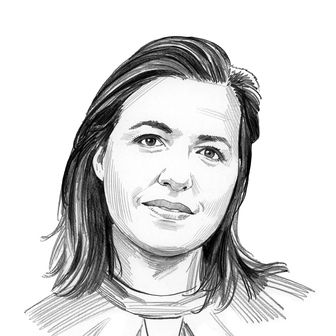
On Monday morning, members of the Yale Law School faculty received a terse message from their provost informing them that Professor Jed Rubenfeld “will leave his position as a member of the YLS faculty for a two-year period, effective immediately,” and that upon his return, Rubenfeld would be barred from teaching “small group or required courses. He will be restricted in social gatherings with students.” As of Tuesday morning, he was no longer listed on the Yale Law faculty site.
Three people familiar with the investigation that led to Rubenfeld’s suspension said it stemmed from the university finding a pattern of sexual harassment of several students. The allegations, which spanned decades, included verbal harassment, unwanted touching, and attempted kissing, both in the classroom and at parties at Rubenfeld’s home.
In a phone conversation Tuesday, Rubenfeld told me, “I absolutely, unequivocally, 100 percent deny that I ever sexually harassed anyone, whether verbally or otherwise. Yes, I’ve said stupid things that I regret over the course of my 30 years as professor, and no professor who’s taught as long as I have that I know doesn’t have things that they regret that they said.”
He added, “Ironically, I have written about the unreliability of the campus Title IX procedures. I never expected to go through one of them myself.”
In 2014, for example, Rubenfeld wrote an op-ed for the New York Times that said that the university that puts in place affirmative-consent standards “encourages people to think of themselves as sexual assault victims when there was no assault” and that it is “illogical” to claim “intercourse with someone ‘under the influence’ of alcohol is always rape.”
Rubenfeld said Tuesday, “I think subsequent to me having written some controversial articles about sexual assault, that I became a target of people making false allegations against me.” Who was making these false allegations, exactly? “I don’t know,” Rubenfeld said, “because of confidentiality. Identities were not revealed to me.”
That’s not true, according to Yale’s stated policies — and one of the complainants. “License to write about sexual harassment is not license to sexually harass,” she told me. “I reported because I was sexually harassed. Now he’s being dishonest about even this aspect of the Title IX process. For example, as Yale’s policy requires, I identified myself to him. I had to, and I did so at considerable risk given his influence in the legal community.”
A spokesperson for Yale declined to comment. In a message to “members of the Yale Law School Community” on Wednesday morning, Dean Heather Gerken wrote, “While we cannot comment on the existence of investigations or complaints, the Law School and the University thoroughly investigate all complaints regarding violations of University rules and the University adjudicates them whenever it is appropriate to do so.” She added, “As Dean, I take this responsibility extraordinarily seriously.”
Multiple women told me that a whisper network about Rubenfeld operated on campus, and that as law-school students, they were warned by peers to be careful around him. One said she was told by a male alum, “You’ve not scraped the bottom of the barrel when it comes to Rubenfeld’s behavior. Stay away.”
Rubenfeld is married to fellow Yale Law professor Amy Chua, author of Battle Hymn of the Tiger Mother, and both wield power in the high-stakes race for judicial clerkships. In the summer of 2018, it was Chua who took to the pages of the Wall Street Journal to vouch for then–Supreme Court nominee Brett Kavanaugh as a “mentor for young lawyers, particularly women.” (That was before allegations of sexual assault against Kavanaugh were made public.) The op-ed noted that the couple’s daughter had been about to clerk for Kavanaugh on the appeals court, and a year later, the Supreme Court acknowledged Sophia Chua-Rubenfeld would clerk for Justice Kavanaugh on the Court instead.
The Guardian first reported on the existence of the investigation into Rubenfeld’s conduct in the fall of 2018. He told the paper that he hadn’t been informed of the specifics but that he had been “advised that the allegations were not of the kind that would jeopardize my position as a long-tenured member of the faculty.” Female students also said that Rubenfeld and Chua discussed with students hoping to work for Kavanaugh the importance of their physical appearance. Chua denied telling students that Kavanaugh preferred attractive female clerks or coaching them on how to dress in “outgoing” fashion for interviews, though a Slate story subsequently reported it had “confirmed the Guardian’s reporting with students who were present at the time.”






























